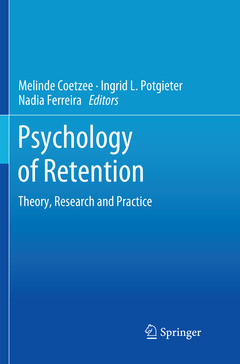Psychology of Retention, Softcover reprint of the original 1st ed. 2018 Theory, Research and Practice
Coordonnateurs : Coetzee Melinde, Potgieter Ingrid L., Ferreira Nadia

Chapter 1. The digital disruption of everything (John Ludike).- Chapter 2. The employee value propositions as a talent retention mechanism in the VUCA world (Dieter Veldsman).- Chapter 3. A framework for understanding turnover intention (Gert Roodt).- Chapter 4. Psychological factors that influence turnover intention: Are they similar across Professional and Administrative job-types? (Leon de Beer).- Chapter 5. The influence of personal attributes on retention (Ingrid L. Potgieter).- Chapter 6. Capitalising on employee’s psychological wellbeing attributes in managing their retention (Melinde Coetzee).- Chapter 7. The Flow@Work model as a talent retention framework for the knowledge economy (Dieter Veldsman).- Chapter 8. Using the Job Embeddedness Theory as a Tool for Improving Employee Retention (Brooks C. Holtom).- Chapter 9. Job Demands, Job Resources and Employee Turnover: The Mediating Effects of Flourishing at Work (Ian Rothmann).- Chapter 10. Talent retention strategies: The role of self-regulatory career behaviour among working adults (Nadia Ferreira).- Chapter 11.Multi-generational workforce and its implications for talent retention strategies (Violetta Khoreva).- Chapter. 12. Millennial and psychological contract: Social constructivist approach (Ade Ima Anggraeni).- Chapter 13. Millennial employees’ retention challenge? Mentoring is the solution ) Mohammad Faraz Naim).- Chapter 14. The same but different: Implications of variation in anticipatory psychological contracts for retention of young talents(Nada Zupan).- Chapter 15. Barriers to older people’s retention in non-profit organizations: A literature review and conceptual framework (Rodrigo Serrat).- Chapter 16. A psychological retention profile: The role of the psychological contract in predicting satisfaction with retention factors (Alda Deas).- Chapter 17. Effects of job embeddedness on organizational citizenship behavior and organizational identification (R. Anbumathi).- Chapter 18. - Remuneration solutions to retention questions (Mark Bussin).- Chapter 19. Total rewards as retention-related dispositions influencing the retention employees (Calvin Mabaso).- Chapter 20. The organisational strategic business context, strategy and the alignment with talent management best practices that deliver real business benefits (Francois Du Plessis).
Explains new conceptual developments in talent retention research and the relevant theoretical frameworks
Provides an exploration of the psychosocial factors that influence individuals’ decisions to join, stay with and leave an organization
Explores how diverse workforce characteristics influence the attraction, development, management and retention of talent
Date de parution : 01-2019
Ouvrage de 440 p.
15.5x23.5 cm
Disponible chez l'éditeur (délai d'approvisionnement : 15 jours).
Prix indicatif 158,24 €
Ajouter au panierDate de parution : 09-2018
Ouvrage de 440 p.
15.5x23.5 cm
Disponible chez l'éditeur (délai d'approvisionnement : 15 jours).
Prix indicatif 158,24 €
Ajouter au panierThèmes de Psychology of Retention :
Mots-clés :
Retention; Psychology of Retention; Turnover Intention; Psychological Contract; Job Embeddedness; Psychological Factors in Retention; Talent Retention Strategies; Multi-Generational Workforce and Retention; Retention Barriers; Remuneration Solutions for Retention; Strategic Business Context and Retention
Ces ouvrages sont susceptibles de vous intéresser

Resourcing and Talent Management 69,32 €


